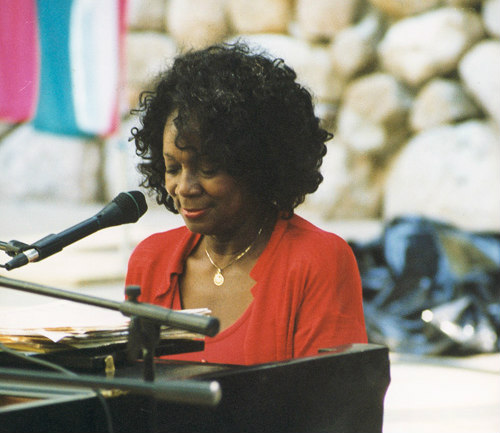Kansas City blues great Jeannie Cheatham has already left a legacy through her music career. But at 90 years old, Cheatham continues to contribute to the blues tradition through the gift of her music royalties and copyrights to the Marr Sound Archive at the University of Missouri–Kansas City.
Cheatham wrote the iconic blues song “Meet Me with Your Black Drawers On,” and the autobiography of the same title. She’s played with jazz and blues greats including Cab Calloway, T-Bone Walker, Joe Williams and Dinah Washington, but her connection to music started before she was six years old when she began playing piano by ear.
“I started playing in church,” Cheatham says. “I couldn’t reach the pedals, so I’d push down the keys and hold. It really strengthened my hands.”
While she did eventually take lessons, strength and endurance were as innate as her musical gift. Denied an art scholarship to college she had won because she is African-American, Cheatham chose a career in music.
“I was playing in my own band, mostly in Canada. But they had strict laws about playing after midnight, so we’d drive down to Buffalo to play in the all-night jam sessions. One night the president of the Elks Club asked if I’d play to help him out. I told him, ‘I don’t want to play with all those old men.’ Well, they were all old men. Except for Jimmy.”
Jimmy Cheatham had just returned from working in Hollywood, and the rest of the band was buzzing about working with him. Jeannie was intrigued, but it was not until they saw one another again two years later that they became a couple.
“The next time I saw him, he was playing a supper club. We ran through his arrangement and just kept going. We just never left,” she says.
The Cheathams were married 48 years until Jimmy’s death in 2007. The couple dedicated their lives to music, through playing together in the Sweet Baby Blues band and Jimmy’s teaching career at the University of California – San Diego.
“We played Kansas City style,” says Cheatham of why she decided to leave an estate gift of the music royalties and the copyrights of her music to the Marr Sound Archives at UMKC. “Kansas City is where jazz and blues got married. It’s the bridge where everybody crossed over. Kansas City style is what gets everybody dancing. The archives has a vision of what the language of music is all about.”
Chuck Haddix, director of the Marr Archive, notes that Cheatham’s gift is incredibly valuable.
“Jeannie has a real connection to Kansas City. Her music was influenced by (Blues Hall of Fame musician) Jay McShann, blues and boogie woogie. When Jeannie launched her career, it was rare for women to be working as instrumentalists in bands,” says Haddix.
The gift is significant, too, as it includes the manuscripts of both Cheatham’s music and her book. “Her music bridges blues and jazz and we have the arrangements of the original scores. The band improvised when they played, of course, but having the original arrangements means the music can be recreated.” He notes that part of the value of the archives is the availability for musicians to research and perform the arrangements held there.
Haddix says that the archives has had a long relationship with Cheatham. “As with many donors, Jeannie contacted us because we have an international reputation for taking care of our collections. We don’t accept them lightly. When we take on collections we make a commitment to preserving them in perpetuity.”
Beyond music students and enthusiasts, Haddix see a value to a broader community. “These collections are relevant to students of culture and gender studies. Jeannie did it her own way and succeeded where a lot of women did not. She was the brains behind the operation.”
Jeannie Cheatham received a United States Congressional Recognition as “Queen of the Kansas City Blues” in 2012. “No one expects something like that,” says Cheatham. “You just do your best to stay on the bandstand and not throw up on your shoes. It’s a good life if you don’t weaken.”

